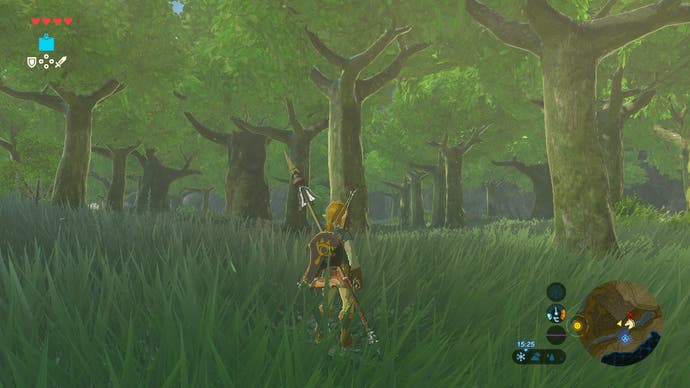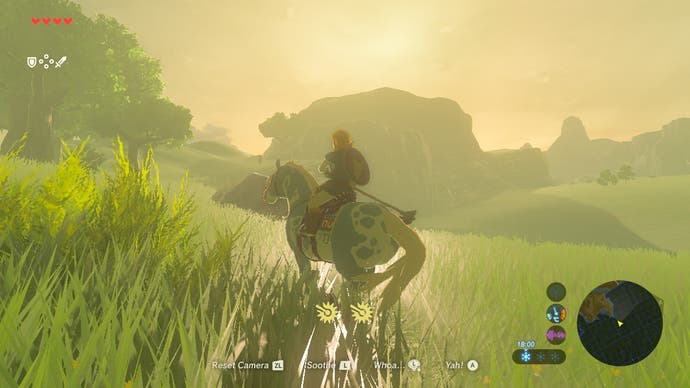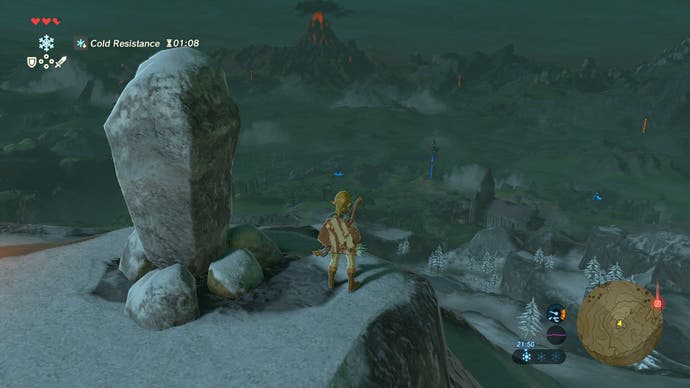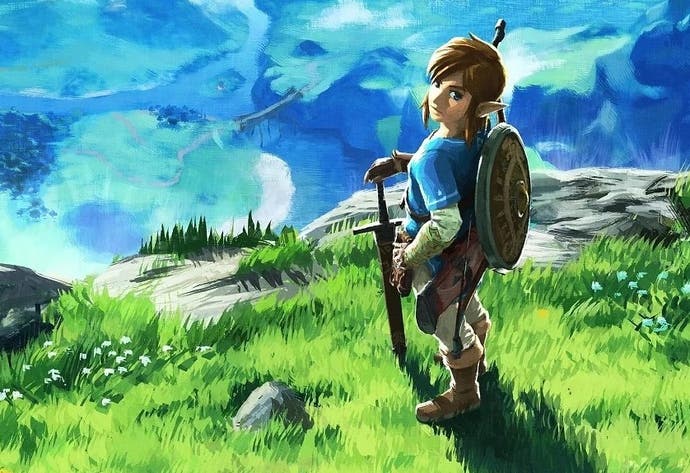Can Tears of the Kingdom match the sly genius of Breath of the Wild's music?
Loose notes.
The best thing about The Legend of Zelda: Breath of the Wild is its emptiness. It landed back in 2017 at the perfect moment: the Ubification of the open world genre was more or less complete, we were all utterly sick of trundling along breadcrumb trails to waypoints while fending off swarms of sidequests, and here was this game made up of mile upon mile of relative nothing - not so much an open world as the artful devastation of an open world, trimmed back to its towers, dungeon mouths and campsites, a world that lets its misty, muddy, cartoon geography do the talking. In practice, there's as much to do here as in any Assassin's Creed or Elder Scrolls. But the possibilities are scattered and overgrown, secrets to find or realise through experimentation, rather than Content that thrusts itself upon your attention.
It's a lonely world, closer to the arid canyons of Shadow of the Colossus than any previous Zelda, but on returning to it ahead of Zelda: Tears of the Kingdom, I realised that it never quite leaves you alone. There's a presence at your elbow throughout: a solitary pianist, who feeds the odd note or phrase into the game's engulfing swell of wind, leaves and water. Most Zelda games have grand, momentum-building overworld themes, the kind of rousing anthem that gets you thinking "oh golly, I have to do something heroic now" and, if you're a scholar of Zelda lore, "oh golly, this is a remix of the Star-Spangled Badger's Theme from Quantum of Ocarina". For Breath of the Wild, Nintendo lightened the soundtrack even as it brushed away the heavily telegraphed optional activities that fill most open worlds, reducing the musical component to a troupe of travelling performers who seem as lost in this landscape as you are.
I don't have the technical vocabulary to really describe what the pianist is doing, but the vibe I get from them is a mixture of curiosity and irresolution, even reluctance, a butterfly-esque inability to settle on any single thing, and a touch of whimsical embarrassment about that inability. They launch into a few chords and trail away with the pedal held, as though distracted by a bird call or the re-appearance of the sun. A few seconds later there's a trickle of high notes, as though in mimicry of that bird, then a series of chords which seem muffled, as though the pianist had drifted into the undergrowth and were circling a tree, one hand on the trunk, the other on the keys. They're most sure of themselves on the heights - freed, like you, of the geography's intricate moving parts, able to look out and offer some mournful, overall reflections, with the spectre of Hyrule Castle festering in the distance.
This is all projection, of course, but as with all videogame music, it's projection brought on by composition that aims to guide the player's mood and behaviour. Guide and perhaps, comment upon. Sometimes the piano feels like it's trying to play you, in multiple senses. It wants you to feel pleasantly lost in a world whose smiling desolation is always bringing you to a halt, mesmerised, even as every curve of the road throws up some gently magnetic object of interest. Other times, it sounds like it's reacting to your movements, swept along behind as you race for the next landmark, or knocked askew as you slide off the critical path to investigate a cracked rockface. One of the great surprises of Breath of the Wild, for me, was learning that while the soundtrack is layered and dynamic - it has escalating tiers of combat music, for instance - the piano isn't fully context-sensitive. It's not a collection of short slices triggered and reshuffled by player behaviour, as in Untitled Goose Game. It's just so carefully arranged in response to the world and your likely actions that it always sounds like it's standing right next to you, thinking aloud.


I had a quick chat with Ed Nightingale - who has actual degrees in music and performance, together with years of music industry experience - about all this. He compared Breath of the Wild's overworld piano to "rubato", which refers to performers varying the tempo of a piece here and there, speeding up and slowing down for additional expressivity or personality. Rubato comes from the Italian "rubare", "to rob": apparently, it was once defined as one note or section 'stealing time' from the next.
I think often about how games steal our time, and the centrality of their audio and music to this endeavour. Zelda is both a series in which musical instruments have magical powers, and a series where the music is magically entangled with the game design. Its worlds are at once sealed away and unlocked, mystified and demystified by their soundtracks. Music is their salvation: in game after game, Link rescues Hyrule from Ganon by calling upon melodies that open gates and heal the sick, that dispel illusions, alter the weather and, above all, accelerate or rewind the flow of history itself. But they are also home to songs that are designed to entrap and confuse, that prey upon the carefree wanderer. Take Breath of the Wild's Lost Woods theme. It's essentially four notes on loop, but they're varied, re-weighted and fragmented from loop to loop so as to deny your brain a point of focus or closure. The area feels endless because it sounds endless, without quite becoming repetitive. Its apparently interchangeable, yet invisibly ordered spaces find expression in a motif that is both relentlessly different and relentlessly the same.

The piano music of Hyrule's wider landscape is less insistent, but in its way, similarly manipulative. It thrills and disarms with lingering, unreadable silences. It nudges and invites, leaving a phrase open for you to complete in some fashion. It breaks from the monolithic scores of older Zeldas, but it’s still an imposing presence. That trickle of high notes might lead you to the summit of one of the strange buildings you spy poking from the forests, robbing you of the 15 minutes you'd planned to spend reaching the next shrine. Or perhaps those lower chords have an air of finality to them - when was the last time you saved your game?
As I said, I don't have the technical vocabulary to break all this down properly, but I was lucky enough to spend a few years learning the piano as a kid, and have a certain ear for a tune. I've developed a repertoire - or at least, a collection of ramshackle variations - by feeling various pieces out at the keyboard. On the one hand, Pink Floyd, Oasis and The Doors. On the other, the Star Trek: First Contact theme, Sonic 3's Ice Cap Zone, a bit of Holst because it sounds nice at Xmas parties, and a couple of Final Fantasy intros. All these songs have melted together in my head in such a way that I wander half-consciously between them as I play, often surprising myself when some accidental combination of loose notes sends me off in a fresh direction. As with Breath of the Wild, the question is whether I'm playing or being played by the music. The outcome, either way, is that I feel delighted.










